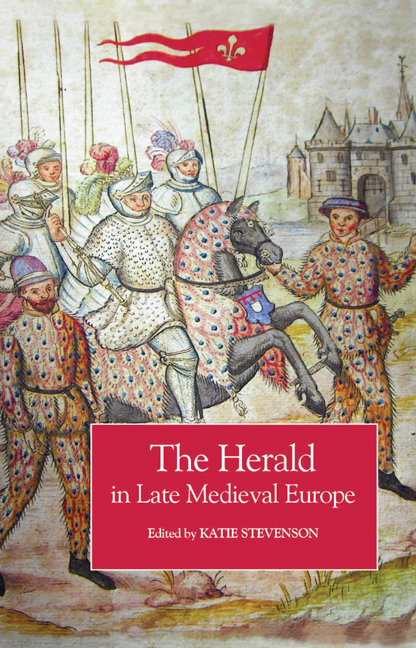Book contents
- Frontmatter
- Contents
- List of Illustrations
- Notes on Contributors
- Acknowledgements
- Abbreviations
- 1 Introduction
- 2 The Development of the Office of Arms in England, c. 1413–1485
- 3 Ancient Precedent or Tudor Fiction? Garter King of Arms and the Pronouncements of Thomas, Duke of Clarence
- 4 Jurisdiction, Authority and Professionalisation: The Officers of Arms of Late Medieval Scotland
- 5 The March of Brittany and its Heralds in the Later Middle Ages
- 6 City Heralds in the Burgundian Low Countries
- 7 King of Arms of the Ruwieren: A Special Function in the German Empire
- 8 Heraldry, Heralds and Politics in the Republic of Florence in the Late Middle Ages
- 9 Tournaments, Heraldry and Heralds in the Kingdom of Poland in the Late Middle Ages
- 10 A time when ‘fools and dwarfs were highly esteemed’? Seeking the Late Medieval Scandinavian Herald
- Index
1 - Introduction
Published online by Cambridge University Press: 26 October 2017
- Frontmatter
- Contents
- List of Illustrations
- Notes on Contributors
- Acknowledgements
- Abbreviations
- 1 Introduction
- 2 The Development of the Office of Arms in England, c. 1413–1485
- 3 Ancient Precedent or Tudor Fiction? Garter King of Arms and the Pronouncements of Thomas, Duke of Clarence
- 4 Jurisdiction, Authority and Professionalisation: The Officers of Arms of Late Medieval Scotland
- 5 The March of Brittany and its Heralds in the Later Middle Ages
- 6 City Heralds in the Burgundian Low Countries
- 7 King of Arms of the Ruwieren: A Special Function in the German Empire
- 8 Heraldry, Heralds and Politics in the Republic of Florence in the Late Middle Ages
- 9 Tournaments, Heraldry and Heralds in the Kingdom of Poland in the Late Middle Ages
- 10 A time when ‘fools and dwarfs were highly esteemed’? Seeking the Late Medieval Scandinavian Herald
- Index
Summary
IN THE SEVENTEENTH AND EIGHTEENTH CENTURIES, particularly in the British Isles, antiquarian scholars and heralds began to write about the history and science of heraldry. Men such as Edward Bysshe, Elias Ashmole, John Anstis, George Mackenzie of Rosehaugh and Alexander Nisbet produced significant annotated editions and collections of sources comprehending such diverse subjects as the genealogy and coats of arms of the nobility, the art and laws of heraldry, the court of chivalry, chivalric orders and the history of the officers of arms. Interest in these officers was further developed in the nineteenth century, as part of the European vogue for all things ‘medieval’, and into the twentieth century, when the first attempts at comprehensive histories of heralds were written. Most influential amongst these latter works were the two significant tomes written by Anthony Wagner, himself a herald: Heralds and Heraldry and the Heralds of England. However, it was not until the 1980s that the study of officers of arms made an impact on mainstream academic scholarship, with research by Maurice Keen leading the way. Keen devoted an entire chapter of his Wolfson Award-winning Chivalry (1984) to the subject of heralds and heraldry, inaugurating a new phase in the way in which scholars viewed officers of arms. In Keen's view, heralds were significant because by the fourteenth century they had an established position and were dignified figures of the chivalrous world’. However, Keen's work on medieval heralds remains very much an exploratory overview. It was never intended to be comprehensive and thus left much scope for research in this field. Continental scholars have been rather more quick off the mark than their English-speaking colleagues in identifying the potential for important research into the office of arms. The work of Gert Melville, for example, has been very influential. The recent completion of Torsten Hiltmann's project at the Deutsches historisches Institut Paris on the officers of arms in late medieval Burgundy marks a significant advance in our knowledge and a prosopographic and fully searchable database will be available online from 2009. Several contributors to this present volume have also shaped our understanding of the subject: in particular, Adrian Ailes, Michael Jones and Wim van Anrooij.
- Type
- Chapter
- Information
- The Herald in Late Medieval Europe , pp. 1 - 8Publisher: Boydell & BrewerPrint publication year: 2009

